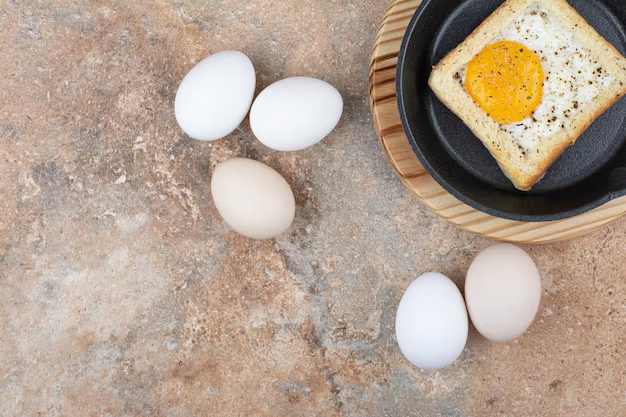How Long Can You Keep Fresh Eggs in the Refrigerator?
Cracking open a fresh egg brings a richness to our culinary palette that few ingredients can match. Whether it's the creamy texture of a perfectly poached egg or the foundation it builds for baked goods, eggs are a staple in kitchens worldwide. But how do you ensure you're using fresh eggs and how long can you safely store them in the refrigerator? Plus, what's the secret to extending their shelf life? This guide will help you navigate these questions with confidence.
🥚 Understanding Egg Freshness
What Does Freshness Mean for Eggs?
Egg freshness can be a bit of a mystery. In essence, it refers to both the age of the egg and its quality:
- Age: The time since the egg was laid.
- Quality: This pertains to the condition of the egg’s yolk, white, and shell.
Key Indicators of Freshness
- Eggshell: A fresh egg typically has a rough, slightly chalky shell.
- Egg White: It should be thick and viscous, clinging closely to the yolk.
- Yolk: A fresh yolk is firm and stands up when placed on a flat surface.
How to Test for Freshness at Home
The float test is a simple and effective way to check an egg's freshness:
- Fill a bowl with water.
- Gently place the egg in the water.
- Observe:
- Fresh: Sinks and lays flat on its side.
- Older but Usable: Sinks but stands upright or tilts.
- Expired: Floats to the top.
🕒 Storing Eggs in the Refrigerator
General Guidelines
When stored properly, eggs can last a surprisingly long time in the fridge:
- Refrigeration significantly slows down the aging process. It halts the growth of bacteria and maintains the egg quality.
- Recommended storage time: Generally, eggs can be kept in the refrigerator for about 3 to 5 weeks from the date of purchase.
Tips for Optimal Storage
- Keep Eggs in Their Original Carton: The carton protects eggs and helps prevent them from absorbing strong odors and flavors from other foods.
- Store on a Refrigerator Shelf: Rather than the door, as this provides a more consistent temperature.
Signs an Egg Should Be Discarded
- Off-scent: An unpleasant sulfur smell indicates spoilage.
- Visible Defects: Cracks or slimy residue on the shell.
🍳 Enhancing the Shelf Life of Eggs
Factors Affecting Shelf Life
- Temperature: Consistent cold temperatures are crucial for prolonging shelf life.
- Humidity: Eggs should be stored at moderate humidity.
Ways to Extend Egg Longevity
- Coating with Mineral Oil: Lightly rubbing a bit of mineral oil on the eggshell can mimic its natural bloom protection.
- Freezing Eggs: Crack them, beat lightly, and store in a freezer-safe container. They can last up to a year this way.
🧑🍳 Practical Uses and Tips for Older Eggs
Cooking with Aged Eggs
Older eggs can still be valuable in the kitchen:
- Baking: Slightly aged eggs can whip up better as they tend to have thinner whites.
- Hard-Boiled Eggs: Easier to peel when slightly aged.
Beyond Cooking
Uses for older eggs extend beyond cooking:
- Gardening: Eggshells can be crushed and used as a natural fertilizer.
- Crafting: Blown eggshells are a traditional craft material.
📈 Consumer Summary Tips
Here are some actionable tips for you to handle egg storage efficiently:
- 🗓️ Check Dates: Always note the expiration or "best by" date.
- 🧊 Prioritize Proper Storage: Keep eggs in their carton and refrigerate promptly.
- 🌡️ Monitor Conditions: Ensure a consistent fridge temperature, ideally below 40°F (4°C).
🥗 Expanding Your Egg Knowledge
The Role of Eggs in the Kitchen
Eggs are far more than just a breakfast staple:
- Binding Agent: Essential in recipes to hold ingredients together.
- Emulsification: The secret behind thick, stable sauces like mayonnaise.
- Leavening Agent: Gives cakes and soufflés their airy texture.
Egg Safety and Nutritional Value
Eggs are packed with protein and provide essential nutrients like vitamin D and various minerals. However, safe handling is key:
- Avoid Cross-Contamination: Use separate utensils and cutting boards for raw eggs.
- Cook Properly: Ensure eggs are cooked to an internal temperature of 160°F (71°C) to eliminate potential bacteria like salmonella.
🍽️ The Future of Egg Storage
As technology advances, new methods of extending the shelf life of eggs are emerging. Innovations such as precision temperature control in fridges and more effective packaging materials continue to evolve, ensuring that eggs can stay fresh even longer and reduce food waste.
Using fresh eggs gives you peace of mind and ensures the best culinary results. By understanding how to store and check the freshness of your eggs, you play a crucial role in maintaining their quality. Remember, always trust your senses when evaluating whether an egg is fresh, and enjoy the culinary possibilities that eggs bring to your table!

